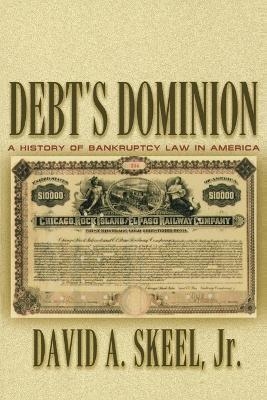
Debt's Dominion
Princeton University Press (Verlag)
978-0-691-11637-2 (ISBN)
Bankruptcy in America, in stark contrast to its status in most other countries, typically signifies not a debtor's last gasp but an opportunity to catch one's breath and recoup. Why has the nation's legal system evolved to allow both corporate and individual debtors greater control over their fate than imaginable elsewhere? Masterfully probing the political dynamics behind this question, David Skeel here provides the first complete account of the remarkable journey American bankruptcy law has taken from its beginnings in 1800, when Congress lifted the country's first bankruptcy code right out of English law, to the present day. Skeel shows that the confluence of three forces that emerged over many years--an organized creditor lobby, pro-debtor ideological currents, and an increasingly powerful bankruptcy bar--explains the distinctive contours of American bankruptcy law. Their interplay, he argues in clear, inviting prose, has seen efforts to legislate bankruptcy become a compelling battle royale between bankers and lawyers--one in which the bankers recently seem to have gained the upper hand.
Skeel demonstrates, for example, that a fiercely divided bankruptcy commission and the 1994 Republican takeover of Congress have yielded the recent, ideologically charged battles over consumer bankruptcy. The uniqueness of American bankruptcy has often been noted, but it has never been explained. As different as twenty-first century America is from the horse-and-buggy era origins of our bankruptcy laws, Skeel shows that the same political factors continue to shape our unique response to financial distress.
David A. Skeel, Jr. is a professor of law at the University of Pennsylvania and has written widely on corporate and bankruptcy issues.
INTRODUCTION 1 PART ONE: THE BIRTH OF U.S. INSOLVENCY LAW 21 CHAPTER ONE: The Path to Permanence in 1898 23 CHAPTER TWO: Railroad Receivership and the Elite Reorganization Bar 48 PART TWO: THE GREAT DEPRESSION AND NEW DEAL 71 CHAPTER THREE: Escaping the New Deal: The Bankruptcy Bar in the 1930s 73 CHAPTER FOUR: William Douglas and the Rise of the Securities and Exchange Commission 101 PART THREE: THE REVITALIZATION OF BANKRUPTCY 129 CHAPTER FIVE: Raising the Bar with the 1978 Bankruptcy Code 131 CHAPTER SIX: Repudiating the New Deal with Chapter 11 of the Bankruptcy Code 160 PART FOUR: THE VIEW FROM THE TWENTY-FIRST CENTURY 185 CHAPTER SEVEN: Credit Cards and the Return of Ideology n Consumer Bankruptcy 187 CHAPTER EIGHT: Bankruptcy as a Business Address: The Growth of Chapter 11: Practice and Theory 212 EPILOGUE: Globalization and U.S. Bankruptcy Law 238 NOTES 245 INDEX 273
| Erscheint lt. Verlag | 30.11.2003 |
|---|---|
| Zusatzinfo | 4 tables |
| Verlagsort | New Jersey |
| Sprache | englisch |
| Maße | 152 x 235 mm |
| Gewicht | 425 g |
| Themenwelt | Recht / Steuern ► EU / Internationales Recht |
| Recht / Steuern ► Wirtschaftsrecht ► Bank- und Kapitalmarktrecht | |
| Recht / Steuern ► Wirtschaftsrecht ► Handelsrecht | |
| ISBN-10 | 0-691-11637-7 / 0691116377 |
| ISBN-13 | 978-0-691-11637-2 / 9780691116372 |
| Zustand | Neuware |
| Informationen gemäß Produktsicherheitsverordnung (GPSR) | |
| Haben Sie eine Frage zum Produkt? |
aus dem Bereich


